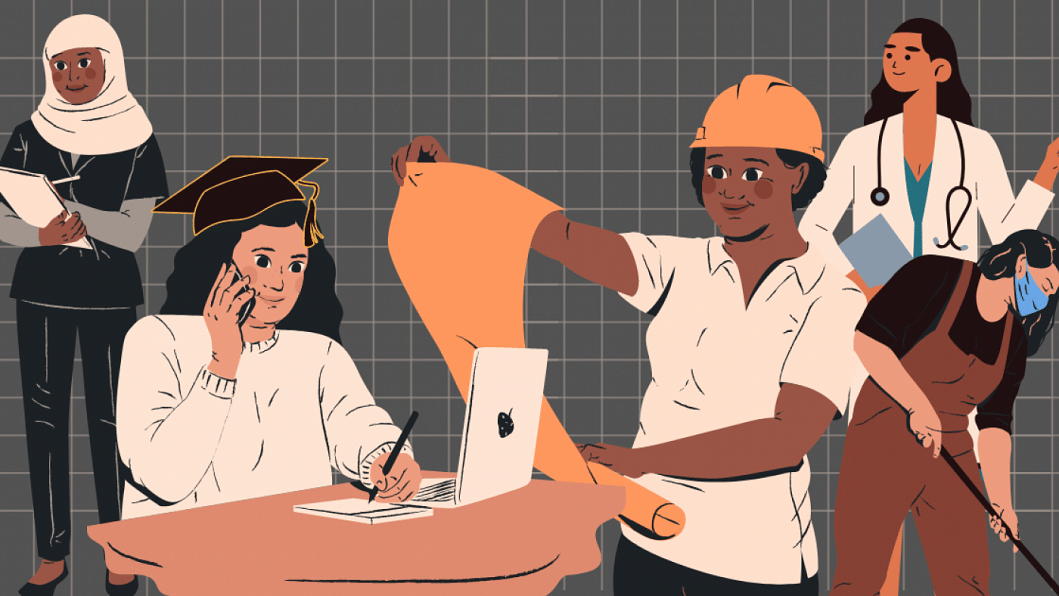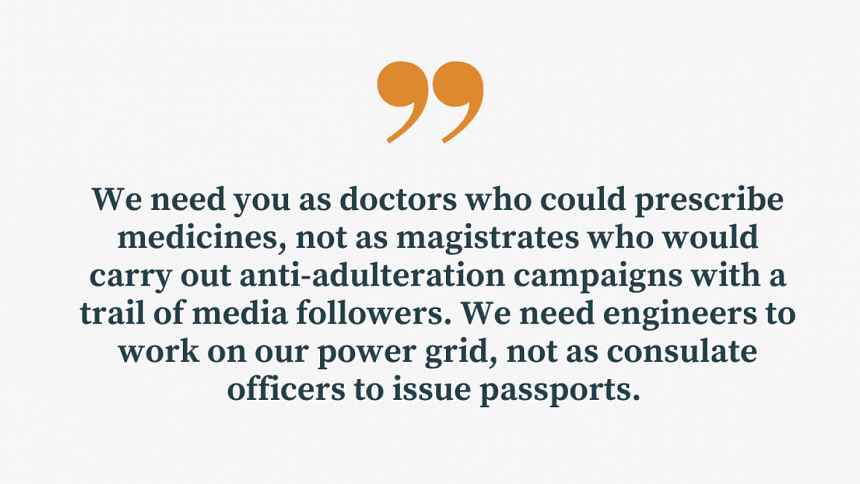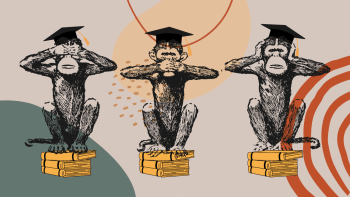Why the mismatch between what we study and what we do?

Two female train operators are among the pool of drivers and station controllers who will be in the driving seats of our much-awaited metro rail that is all set to open on our Victory Day. We have already heard of the first-ever all-female crew flying a domestic flight of Biman Bangladesh Airlines from Dhaka to Sylhet on International Women's Day in 2017. The feat was followed by an all-female flight deck crew in charge of the Boeing 787 Dreamliner that flew from Dhaka to Riyad in December 2018. The presence of these two female drivers would make a huge statement about the increasing female participation in our national growth.
As an academic, however, I was interested in the background of these trainee drivers. Moriyom Afiza is a chemical engineer from Noakhali Science and Technology University, and Asma Akhter graduated in physics from Titumir College in Dhaka. While I understand Asma's academic training required for the job, it is Moriyom's background that intrigued me. Isn't she overqualified for the job?
It made me think of an entry-level administrative officer we had in the department I was once a part of. She had a bachelor's degree in electrical engineering from a leading private university. At the interview board, I kept on wondering why someone with her background would apply for a job with a salary of Tk 20,000 per month. She had probably spent lakhs of taka over four years for her BSc degree in electrical engineering, let alone the hours of lab work and studying. She worked another four years with us simply to recover her investment. And hers was not a job with extra incentives.

I don't know how much a train driver will make on a government payroll, but it sure is not enough to honour Moriyom's degree in chemical engineering. I am not in a position to comment on the personal reasons for choosing this profession, apart from the media-friendly quotable quote, "I always wanted to be a train driver!" At least in her case, unlike my colleague with an engineering background, she used a taxpayer's subsidy to go into a system with a minimum financial investment.
But the same question can be asked to those architects, engineers, doctors and other professional degree holders, such as agricultural scientists and social scientists, who join the cadre service to serve in customs, police, or even in foreign service. We, the taxpayers, have been paying for your professional degree for a certain profession. We need you as doctors who could prescribe medicines, not as magistrates who would carry out anti-adulteration campaigns with a trail of media followers. We need engineers to work on our power grid, not as consulate officers to issue passports. There is a complete mismatch between what we study and what we do.
The lack is reflected in our policy-level engagement. No wonder, we end up appointing a person with a literature background (hypothetical example) as the central human resource figure of our public service commission, or a military officer with an artillery background as the chief operating officer of the city corporation, tourism, or any other government unit, for that matter. Then we have the irony of graduates in political science or philosophy (having passed through the civil service drill) looking after the doctors and engineers. What's worse is when the backbencher politicians return with vengeance to cower the professions after attaining some political portfolios or career lifts.
There is no serious study on the kind of jobs that are out there and the kind of degrees or training that we are providing in our academic institutions. I guess the danger of such a study is that it will make many of our degree-awarding programmes redundant. With unemployment on the rise, candidates are forced to make compromises. For a probationary officer in a bank, you will get even MPhil degree-holders in Persian. An employer faced with thousands of applications would end up choosing candidates with much higher qualifications than was originally advertised. After all, it is safe to assume that a person who has spent four years for undergraduate, one year for postgraduate and two years for their ongoing MPhil (which, by the way, was their proxy decision to make themselves useful or ensure their stay in the dormitory while waiting for a job) will get preference over a simple graduate. In theory, that candidate has shown much more perseverance and motivation than a candidate with a two-year BA pass course. But do we need an MPhil degree-holder for a clerical position?
As part of the quality assurance projects, all universities are now instructed to prepare outcome-based curricula. We are now told to incorporate essential skills as employers complain that university graduates don't have what they require in the real world. A recent study by ActionAid suggested that even 78 percent of students feel that their universities have failed them in giving them the right skill sets for the job market. Then there is this buzz word of entrepreneurship. We expect our students to find their jobs and give jobs to others. Students tend to pick up more on the technicalities from YouTube tutorial videos. The significance of basic degrees in economics, physics, statistics, and mathematics has been downplayed by the system. Everyone is busy with the paper trail, checking the right boxes, and looking good on their CV.
The silver lining comes from a recent announcement of education as a megaproject. One can only hope that this megaproject will entail mega-thinking and planning. What we need right now is an updated pedagogy that understands the human resources that we have. How much of these resources will be involved in knowledge production and innovation? How many of them will be involved in the service sector, and how many of them will go abroad as skilled and unskilled workers? How many of them will get into administration? What kind of aptitude do we need? There are new algorithms and psychological tests to determine the career or creative orientation of a student. Instead of churning out graduates who don't find any affinity between what they have studied and what they do, we need policy interventions, strategic training, and career-mapping. The demographic dividend through which we plan to utilise the prime time of our young men and women for the exponential growth of our country will be lost otherwise.
Dr Shamsad Mortuza is the pro-vice-chancellor of the University of Liberal Arts Bangladesh (ULAB).

 For all latest news, follow The Daily Star's Google News channel.
For all latest news, follow The Daily Star's Google News channel. 







Comments